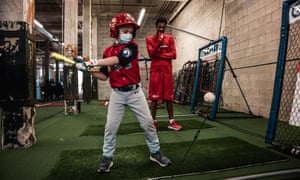On Fridays, Mariela Garcia listens with earbuds as classes from Eastwood Academy in Houston stream in through Microsoft Teams.
But she also keeps an eye on business.
When her mother lost her job at an adoption agency at the start of the pandemic, the senior began thinking of ways to contribute – and cover her college application fees. Each week, she spends three days shopping and prepping ingredients for her Mexican pastry business, Hecho con Amor, or Made with Love. To get ready for her weekly shift at a farmer’s market, she folds empanada dough over apple, pumpkin and cheesecake filling while signed into virtual classes.
“I’m listening to the teacher, but I’m also getting DMs on my Instagram – ‘Hey, what are your flavors?’” said Garcia. “That’s potential business, and I would hate to lose any customers.”
For many teens, a year of the coronavirus has meant not only the loss of in-person learning and time with friends, but added shifts at convenience stores and retail shops to help keep their families afloat during the recession. As kids adapt, many of their teachers and schools are improvising as well, extending deadlines and creating new ways to stay in touch. The huge workload is leaving many students stressed out, and some teachers worry they’re in danger of becoming a statistic: the estimated one out of 20 teens who drop out of high school each year, according to federal data.

Jay Novelo, a dean at Tyee high school, near Seattle, was hired to handle student discipline. But with schools closed, his main job is keeping tabs on students and encouraging them to not give up on school.
For most, it’s a tough choice. “Do I want to … survive school or survive life?” Novelo said. “I can’t blame the students – a lot of them choose work.”
One of the 14 students he checks in on weekly is Swin Cobón Sanchez, who bounces between school and two jobs. By day, he cleans houses with his immigrant parents; at night, he mops, vacuums and empties trash at a downtown Seattle medical clinic – a second job he picked up in part to help pay the family’s bills.
That doesn’t leave a lot of room in the day for remote learning, but he makes time for weekly check-ins with Novelo. They chat about soccer, Sanchez’s 2017 Chevy Silverado and the extra class he’s taking to hit the 24 credits he needs to graduate this year.
“I like it, because I know somebody is staying on me,” Sanchez said.
Teens who have joined the workforce hail from families that are predominantly Hispanic and Black, front-line workers and first-generation immigrants who have borne the brunt of the job loss and economic hardship brought on by the pandemic, teachers and counselors said. According to the Center on Budget and Policy Priorities, four in 10 children live in families that have struggled to cover basic expenses during the past year. The relief bill President Joe Biden signed last week aims to fill some of those gaps, providing most families up to $300 per week for each child through the end of 2021.
Some students, like Garcia, are thriving under the flexibility afforded by the pandemic: despite the job, she’s earning As and Bs. But the lifestyle is not for everyone.
“There are definitely some kids who are having issues around time management,” said Joshua Weintraub, the director of college and career success at Lighthouse Community charter school in Oakland, California. ‘There aren’t enough hours in the day. They’re prescribing themselves caffeine.”
Yasmine Esquivel, a senior at Lighthouse works up to 30 hours a week at Gap, helping her mom with groceries because she saw “how tight money was”.
“I get stressed and I know my mom can see it,” she said. “She sometimes tells me to leave my job to focus on school.”
‘The lifeline our students needed’
Balancing work and academics is harder in states where schools have reopened. When in-person classes resumed at Oak Ridge high school in Orlando, Florida, in August, only about 500 of the school’s 2,600 students returned.
Jenevieve Jackson, who teaches digital photo production, still can’t get in touch with many of the students who are supposed to be in her classes. Administrators, she said, have been “relentless in trying to find out what is going on with these kids”.
She suspects a lot of them supervise younger siblings or went back to jobs at places like SeaWorld and Universal Studios when the parks reopened.
Jackson drove to students’ houses in September to loan her remaining classroom cameras to those without cell phones so they could work on projects. And she gave them her own version of a “pandemic stimulus”.
“I said, ‘Your grades suck. Here’s 150 points,’” she said.
Teens don’t always work traditional jobs. Some young Black men in Atlanta have been surviving the pandemic as “water boys”, peddling cold drinks to motorists at freeway off-ramps. Javon Solomon, a ninth grader at Booker T Washington high school, was one of them.
“My mom was working in the mall. She was released from her job,” Solomon said. “We didn’t have enough money or the resources we needed.”
He could pocket $120 a day selling water, but didn’t always feel safe. Many residents consider the young entrepreneurs a nuisance. Fights have broken out between kids competing for street corners and some have gotten arrested.
CJ Stewart, a former outfielder for the Chicago Cubs, gave Solomon an alternative – earn $25 an hour as a coaching “ambassador” working with young Little Leaguers, often from affluent white families.
“If you’re not giving Black teenage boys an opportunity to make money, you’re not really helping them,” Stewart said. His youth baseball nonprofit – Launch Expose Advise Direct, or Lead – connects families with resources for food, clothing, housing and jobs. Some of them, he said, would be homeless if their sons weren’t in the program.

Solomon has the potential to earn over $1,000 a month with private clients and group lessons, in exchange for maintaining good grades, attendance and behavior. Angela Coaxum-Young, principal at Washington High, called Lead “the lifeline some of our students needed to stay in the game of life”. When schools were closed, Stewart was often her only means of communicating with students because the “family was without a phone or had abruptly moved”.
Keeping up with those transitions in students’ lives is why the Highline Public Schools near Seattle assigned staff members like Novelo at Tyee to stay in contact with students. Superintendent Susan Enfield called it “the most important thing that we do”.
Novelo still has students he can’t reach because of outdated phone numbers and addresses. Students are supposed to let schools know if they’re working, but he discovered many of them hadn’t bothered. In addition to weekly Zoom meetings or phone calls to 14 students, he makes socially distant home visits and even delivered an internet hotspot to a student working at Jiffy Lube. The teen offered him a free oil change in return.
If school resumes this semester, Sanchez said he’ll give up his second job cleaning the clinic at night. But he gets upset when his parents talk of exhaustion, aches and pains. He wants to keep helping with the bills. With Sanchez, they can clean more houses.
“My parents are getting older,” he said. “I want to leave them in a safe place.”
